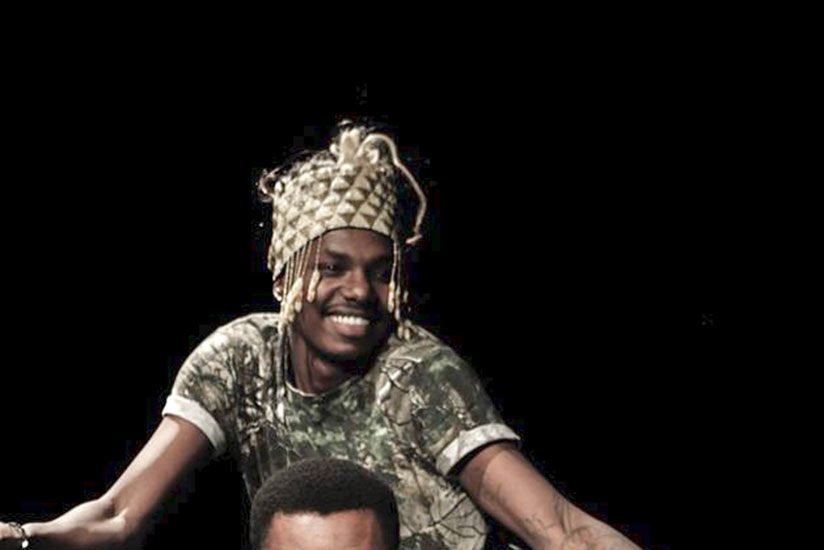Last year, poet, rapper and blogger, Eric 1key decided to experiment with poetry through a series of what he calls ‘Expericment’ concerts, each with a different theme and concept, from politics to sex and identity.


Last year, poet, rapper and blogger, Eric 1key decided to experiment with poetry through a series of what he calls ‘Expericment’ concerts, each with a different theme and concept, from politics to sex and identity.
The last concert was held at Centre Cyprien et Daphrose Rugamba.
"While there, I realised that there were some kids who had talent but nobody knew about them. I spent some days with them, had a workshop and went on stage with them,” he says.
That’s not all. While on stage going about his business, Pierre-Jean Fasan, a French guitarist, who was part of the crowd, picked interest in his work.
Meeting for the second time at Spoken Word where Eric had gone to perform, this time with Inanga player Deo Munyakazi and poet Olivier Tuyisenge, the idea of performing in France at the Le Printemps des Poètes (Poets’ Spring) came up.
Le Printemps des Poètes is an autumn period in France dedicated to poets, and this year’s theme was Afrique (s), dedicated to African poets.
1key’s team represented Rwanda with a unique concept they called ‘The Kifran Collective’ where Kifran stands for Ki-Kinyarwanda Fr- French An- Anglais (English). The whole idea was to recite his poetry in the three languages that define the Rwandan lingual aspect.
Paris experience
Despite the paperwork that saw 1key get the visa on the final day after everyone else, he nevertheless had an unforgettable experience in Paris with their host giving him and Munyakazi what he calls a ‘real Paris experience’, coupled with a number of radio shows and workshops.
When they landed in Paris, they took off to Alain Fournier to perform for a small crowd before preparing the next show in Fasan’s hometown Montauban in Southern France.
"We traveled on Thursday night and in the morning on arrival we went straight to the schools for a workshop. We had workshops with the kids, shot a video and in the evening, we had a show.
"When you walk on the streets you can see the pieces of art on the walls and people reading and it was beautiful. I feel grateful for the opportunity because I don’t like to be owned by anybody and favours are more expensive than money,” he says with a smile.
1key, however, found the theme of the ‘Le Printemps des Poètes’ quite ironic but drew some lessons from the concerts as well.
"The poetry show was meant to be African-themed. Deo and I were the only ones from Africa because many poets from Africa couldn’t get visas and also, most of the Africans who are in the literature sphere already live in Europe. We were the only ones straight from Africa and so you can imagine if we had been denied the visa,” he says.
"One thing I learnt is that they are very time conscious. Everyone is on time and you cannot be before time. Everybody respects time and that’s how everything went smooth because everybody is responsible,” he narrates.
The last show that was held in Montauban was an eye opening moment for him, especially because he managed to keep the whole audience silent and engaged throughout the whole show.
"It was a full house, but for the first time in my career, people understood every line that came out of my mouth. I know because they would ask you questions about particular pieces that we performed. We talked politics, culture and everything because they were curious to know about the country, the depth of poetry in Rwanda and what it’s like to be a poet in Rwanda,” he narrated.
"That doesn’t happen here though. People here will applaud you after the show but that’s not all there is poetry, it’s about conveying a message and the attention that you get”.
Exporting Kifran collective
"The kids in today’s generation are learning different languages altogether. When you learn different languages, you tap into culture and that’s what we wanted to share. There is a possibility that we can do the same and export it to the US next year, either in January or February,” One Key says.
There are a lot of costs involved when it comes to inviting African poets and writers and sometimes you are not guaranteed the visa.
As 1key prepares himself for a poetry gig in Accra, Ghana, later this year, he wants to get many people involved in the Kifran project.
"We are knocking doors to apply for festivals in the US and we need to do more on Africa as well so we don’t need to travel too much to Europe because all you need is an audience and people ready to listen to your pieces.”
editorial@newtimes.co.rw


